Graham Reid | | 6 min read
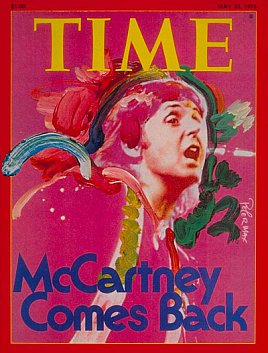
"Wings, only the band the Beatles could have been," said Alan Partridge -- who, we should quickly add, is an alter ego of British comedian Steve Coogan.
Rock writers were understandably unforgiving toward McCartney's post-Beatle band but the public just wouldn't listen to those damn critics. People liked Wings.
They, or more correctly McCartney, made the cover of Time in May 76, had bigger hits than most critics would like to concede (and not just Silly Love Songs or Mull of Kintyre), and on every one of his solo or Wings albums -- over 20, including live albums -- about three times on average McCartney would offer an object lesson in songwriting.
McCartney has always been the unhip Beatle, the one for whom there was no martyrdom but a knighthood. But give the man his due, he could write A Decent Tune. Wings clocked up an extraordinary 27 gold discs in the States and had 18 hits in New Zealand, three going to number one.
What grated with most critics was that Wings didn't progress the way the Beatles did. After all it was only four years between the Beatles' "I wanna hold your hand" and "I'd love to turn you on", and that's a long journey.
No, Wings were what they were, a stadium-filling pop band of journeymen musicians behind one of the cleverest pop writers of his period.
McCartney's solo career began with the deliberately understated, home-recorded album McCartney in 1970. Wings were launched with the equally bantam-weight album Wildlife the following year and the band moniker was retired a decade later after the typically patchy album Back to the Egg. McCartney reverted to his own name for subsequent albums. 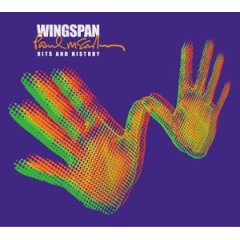
In 2001, 30 years on from his first solo hit -- the execrable Another Day -- McCartney invited a career reconsideration with Wingspan, a double disc subtitled Hits and History, the first disc being the hits, the second being tracks from various Wings albums (and oddly a few from his first two post-Beatles albums under his own name).
Of course in 40 tracks, the fair-minded will say there are creditable gems: Band on the Run obviously; the power pop of Jet; Hi Hi Hi; the volume-requiring nonsense rocker Junior's Farm; the understated segue of Uncle Albert/Admiral Halsey from the excellent Paul and Linda Ram album of 1971; the Lennonesque Let Me Roll It; and the elegantly simple Every Night and early classic Maybe I'm Amazed, both leftovers from Beatles sessions.
There is potent cheap music in the Wings catalogue: the romantic My Love; Waterfalls; Junk; Listen to What the Man Said ...
There's also the likeable but unexceptional cod-reggae of C Moon, and the country-funk of Heart of the Country and pure 70s rock of Back Seat of My Car (both incidently from Ram).
Then there's the unadulterated rubbish which suggests McCartney desperately needed another ego in the same room acting as a filter for his worst tendencies: Live and Let Die which was knocked off in an afternoon and sounds it ("in this ever-changing world in which we live in"?); Venus and Mars/Rockshow which tried to duplicate the Band on the Run template; and the tedious With a Little Luck, No More Lonely Nights and Pipes of Peace. Then there are the songs of no consequence at all: Another Day, Tug of War, Girlfriend, Bluebird and Lovely Linda.
Limitations of playing length have meant there are omissions which might have made this stronger: the lively dance mix/single version of Coming Up; Monkberry Moon Delight which sounded written for Screamin' Jay Hawkins (who covered it); and the blistering rocker Girls School where Macca unleashed his Little Richard vocals again. These and a few others would have given bite to what is sometimes a soft-centred collection, especially on the History disc which sags noticeably in a couple of places.
But in truth that's what McCartney's 30-year post-Beatles career has been like, saggy with moments of brilliance.
One day someone will pull together a McCartney rock compilation -- and people will be amazed, even until recently he was throwing off the self-imposed shackles and letting rip. But too few people have been listening.
Over the long haul Wingspan was a collection of crafted pop-rock of the kind XTC and a thousand other bands have used as a template. In 2000 Detroit alt.rockers White Stripes played in New Zealand and I spoke to Jack White, noting that on their recent albums they had interpolated McCartney-styled pop.
"He's my favourite Beatle," said White. "Which isn't fashionable, but I thought he was the best musician in that band."
No, McCartney isn't fashionable. But musicians respect his songcraft and the public just like what are often little more than silly love songs or potent cheap music.
Wingspan could have been a more convincing case for the defence, but by including the lesser songs it is an honest reflection of a that long and uneven solo career.
It is generally considered that McCartney had one great soingwriting partner who was his foil and kept his sentiment in check. There was another, Elvis Costello with whom he co-wrote a dozen songs in the late 80s.
Those tracks were scattered throughout subsequent McCartney and Costello albums and have only been collected together on bootlegs or MP3 players. 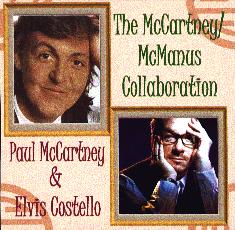
A decent McCartney retrospective -- which would be a fine filter of Wings but include a number of the collaborations with Costello -- would also make for an interesting reconsideration of McCartney's career.
But with Wingspan -- a lost opportunity in many ways -- there are few tracks among the 40 that most people couldn't sing along to and enjoy. And probably even know most of the words.
You can't say that about too many people's catalogue.
Paul McCartney on DVD: The McCartney Years (2007) 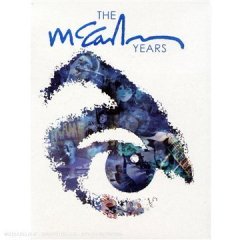
Paul McCartney, now a Knight of the Realm in his late 60s, spent a relatively short part of his extremely long career as An Incandescent Beatle, so this broad spectrum post-Fab Four overview DVD collection of video clips and live footage reminds you of just how big his post-Beatles band Wings actually were.
And how little after that meant much at all, aside from the nostalgia factor.
Wings may have made the cover of Time and spawned pretty good FM radio hits -- but they were also from the period before intelligent video clips. Which Macca concedes in his sometimes bemused/sometimes weary audio commentaries which accompany the Wings clips on this three-DVD collection of videos and interviews.
Here are his many solo years traced in sometimes moving, but often silly love song, videos where his late wife Linda looms large as either muse, keyboard player or presence -- and then all those clips which never even made the small screen when he fell below the interest level of even MOR television.
Did anyone here ever see anything of his sometimes expensively-filmed footage of songs after about 1985?
If not, then here is your chance.
With footage from his MTV Unplugged show in 91, that famous Glastonbury 2004 appearance which was his Lazarus-like rehabilitation into rock culture, and much more besides, this three DVDs (which is a lotta Macca) is history lesson, artist resurrection and tedium in one collection.
But you have to concede two things about McCartney after watching this (especially with the commentary on): he could craft a damn fine pop song even if it might never make radio, and he has a fine sense of self-deprecating humour about his own short-comings.
Some nice things here, some bad 70s clothes, and more than a few lovely songs that you might never have heard before.
One thumb aloft . . . if you get the Macca reference.

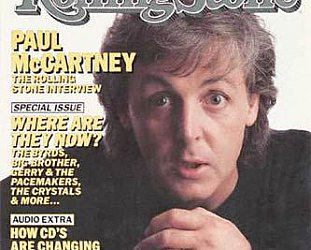
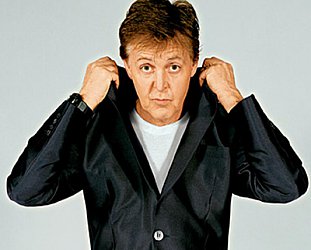




post a comment